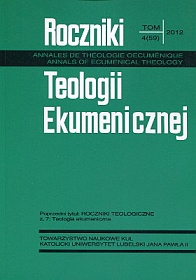What Happened to Sola Scriptura ? How the Bible Was Used in the Fight for Women Priest and Bishops in the Anglican Communion
Abstract
In the article Author examines the traditional meaning of the formula sola Scriptura in the Anglican Church in the epoch of Reformation and confronts it with now-a-days use of the Bible in the process of decision-making in the matter of Church life and doctrine. The sample of this process is the adoption of women’s priestly and episcopal ordination in the Anglican Communion and especially in the Church of England.
Christian denominations being reciprocally connected, the decisions taken in one confession do matter for the rest of the Christendom. This is proved by the substantial change introduced in the Anglican-Roman Catholic dialogue by the unilateral decisions of Anglicans to ordain women. The questioned decisions were taken however on the improper hermeneutics of biblical texts and on the presuppositions leading to dangerous intellectual short-cut. Thus the line of argumentation issued by Anglicans from the Bible omits what the Roman Catholic really stands for. The equal dignity of men and women proved by the biblical texts has never been denied by the Catholics. The argument important for the Catholics that the Church cannot change the will of Christ towards ordination has been simply by-passed by moving this subject from divine to human law.
References
Anglicanism and the Bible. Ed. F.A. Borsch. Wilton 1984.
Anglican-Roman Catholic International Commission: The Agreed Statements: Eucharistic Doctrine 1971. Ministry and Ordination 1973. London 1973.
Authority in the Church. A Statement on the Question of Authority, its Nature, Exercise and Implications Agreed by the Anglican-Roman Catholic International Commission. London 1976.
The Book of Common Prayer. London 1844.
Bray G.L.: Sacraments and Ministry in Ecumenical Perspective, “Latimer Studies” 18, Oxford 1984.
De Mendieta A.: Rome and Canterbury. A Biblical and Free Catholicism. London 1962.
Dillenberger J., Welch C.: Protestant Christianity. New York—London 19882.
Gift of Authority. Authority in the Church III. An Agreed Statement by the Anglican-Roman Catholic International Commission. London 1999.
John Paul II: Encyclical letter «Ut unum sint» of the Holy Father, John Paul II on commitment to ecumenism. Vatican City 1995.
Kasper W.: Mission of Bishops in the Mystery of the Church: reflections on the question of ordaining women to Episcopal office in the Church of England. An address given to the Church of England Bishops’ Meeting, 5 June 2006. http://www.archbishopofcanterbury.org/articles.php/1485/cardinals-address-on-women-bishops-a-clear-and-helpful-contribution-archbishop [access on 5th Jan. 2013].
Lambert B.: Ecumenism: Theology and History. London 1967.
New Revised Standard Version Bible, Oxford 1995.
The Ordination of Women to the Priesthood. A Digest of the Second Report by the House of Bishops (GS 829). London 1990.
Wand J.W.C.: What the Church of England Stands for: A Guide to its Authority in the Twentieth Century. London 1951.
Williams R.: Archbishop’s address at a Willebrands Symposium in Rome. 19th November 2009. http://www.vatican.va/roman_curia/pontifical_councils/chrstuni/angl-comm-docs/rc_pc_chrstuni_doc_20091119_williams-willebrands_en.html [access on 5th Jan.2013].
Women in the Anglican Episcopate. Theology, Guidelines, and Practice. The Eames Commission and the Monitoring Group Reports. Toronto 1998.
Yarnold G.D.: By What Authority? Studies in the Relations of Scripture, Church, and Ministry. London 1964.

